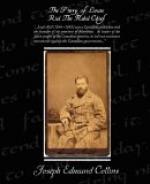“To Alexander Saunders:
“DEAR SIR,—Would you be good enough to call at my house this evening at eight o’clock?
“Yours truly,
“Thomas Brown.”
Having sealed and dispatched this note he resumed his work, without showing or feeling any further concern about the matter. When it was growing dark over the prairie that evening, the love-lorn Jennie saw her pleading-eyed lover pass along in the shadow of the poplars toward her guardian’s house. She heard his ring at the door, and his step in the hall. Her heart was in a great flutter; but her sister was at her side giving her comfort. The doors were wide open, but everything was so husht, that the girls could plainly hear the following words spoken in the guardian’s library:
“I understand, Mr. Saunders, that you have been taking the astonishingly presumptuous course of soliciting the hand of one of my wards. I am not given to severity, or I do not exactly know how I ought to resent an act which exhibits such a forgetfulness of what your attitude should be towards a person in the station of my ward. You are merely a half-breed; you are half-Indian, and for that matter might as well be Indian altogether. My ward’s position is such that the bare idea of such a union is revolting. She is a lady by birth and by education, and is destined for a social sphere into which you could never, and ought never, enter. You may now go, sir, but you must remember that your ignorance is the only palliation of your presumption. Laurie, show this young man the way out.”
“O, my God, what will become of me?” sobbed poor Jennie. “I cannot live! O, I will go after him! I will fly with him! I cannot endure this separation! O, sister, will you not intercede for my beloved? Tell uncle how noble and manly, and honourable he is! Can you not do anything for me? My God, what shall I do?”
In this fashion did poor Jennie’s grief find words, and we leave her alone with her sore heart, while we follow the rejected suitor. He walked swiftly down the lawn, turning not his eye, or he might have seen in the window his lover, stretching imploring arms toward him. All his blood was running madly in his veins, and it burned like fire. His heart was hot, and his temples throbbed.
“So I am only a half-breed, and might as well be all Indian for that matter! O, God! A despised half-breed! They have shown the fangs at last. We now see how they regard us.” And he went forth among his friends, and told the story of the insult and humiliation. A thousand half-breed hearts that night in Red River burned with vengeance against the white man; French Metis and English Metis alike had felt the sting of the indignity; and these two bodies, sundered before through petty cause, now united in a brotherhood of hate against the white population. It needs no further words to shew how ready these dusky people would be to rise and follow a crafty leader, who cried out:




